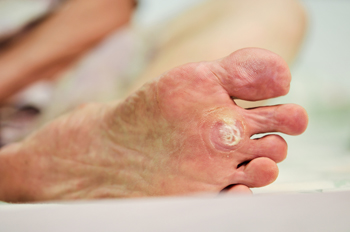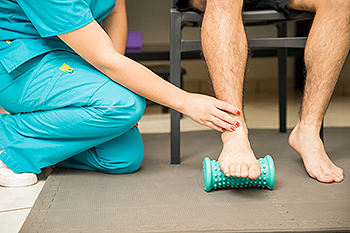Items filtered by date: August 2023
Treating and Preventing Plantar Warts

Plantar warts are stubborn growths caused by human papillomavirus, abbreviated HPV, and can be a source of discomfort and frustration. If you are attempting to manage these types of warts, there are effective ways to address them. Over-the-counter treatments containing salicylic acid can help dissolve the warts over time. Alternatively, your podiatrist can use cryotherapy to freeze the warts off. It is important to avoid picking or scratching the warts, as this can spread the virus. To help prevent plantar warts, keep your feet dry and clean, especially in damp environments, such as locker rooms or public showers. Wearing appropriate shoes, such as flip-flops, in communal areas can help to reduce the risk of exposure. If you have developed a plantar wart, it is suggested that you consult with a podiatrist who can guide you toward the treatment method that is right for you.
Plantar warts can be very uncomfortable. If you need your feet checked, contact Patrice Antero, DPM from Tuscany Podiatry. Our doctor will assist you with all of your foot and ankle needs.
About Plantar Warts
Plantar warts are the result of HPV, or human papillomavirus, getting into open wounds on the feet. They are mostly found on the heels or balls of the feet.
While plantar warts are generally harmless, those experiencing excessive pain or those suffering from diabetes or a compromised immune system require immediate medical care. Plantar warts are easily diagnosed, usually through scraping off a bit of rough skin or by getting a biopsy.
Symptoms
- Lesions on the bottom of your feet, usually rough and grainy
- Hard or thick callused spots
- Wart seeds, which are small clotted blood vessels that look like little black spots
- Pain, discomfort, or tenderness of your feet when walking or standing
Treatment
- Freezing
- Electric tool removal
- Laser Treatment
- Topical Creams (prescription only)
- Over-the-counter medications
To help prevent developing plantar warts, avoid walking barefoot over abrasive surfaces that can cause cuts or wounds for HPV to get into. Avoiding direct contact with other warts, as well as not picking or rubbing existing warts, can help prevent the further spread of plantar warts. However, if you think you have developed plantar warts, speak to your podiatrist. He or she can diagnose the warts on your feet and recommend the appropriate treatment options.
If you have any questions please feel free to contact our office located in Tuscaloosa, AL . We offer the newest diagnostic and treatment technologies for all your foot and ankle needs.
Symptoms of Foot Problems in Children

A child's developing feet undergo significant changes during their early years. The medial arch, formed by bones, muscles, and ligaments, gradually takes shape, resulting in a visible arch in the sole. Infants and young children often have flat feet, which is normal due to their flexibility. As kids learn to walk, their ligaments and muscles strengthen, and the arch area becomes less pronounced. By around six years old, most children should have developed normal arches. If a child experiences foot pain or seems to struggle to keep up with peers, a problem may be developing. Two conditions, in-toeing, when the feet turn inwards, and out-toeing, when the feet turn outwards, may require attention. In many cases, in-toeing might resolve on its own, but a persistent or severe case should be assessed, especially if it hinders the child's gait or causes tripping. Out-toeing often resolves as posture and balance improve, but serious cases or those causing pain should be addressed. Parents should also be vigilant about other symptoms like abnormally shaped toes, ingrown toenails, bunions, stiffness, limping, and sudden gait changes. If your child's feet are raising concerns or causing pain, it is suggested that you make an appointment with a podiatrist.
Making sure that your children maintain good foot health is very important as they grow. If you have any questions, contact Patrice Antero, DPM of Tuscany Podiatry. Our doctor can provide the care you need to keep you pain-free and on your feet.
Keeping Children's Feet Healthy
Having healthy feet during childhood can help prevent medical problems later in life, namely in the back and legs. As children grow, their feet require different types of care. Here are some things to consider...
Although babies do not walk yet, it is still very important to take care of their feet.
Avoid putting tight shoes or socks on his or her feet.
Allow the baby to stretch and kick his or her feet to feel comfortable.
As a toddler, kids are now on the move and begin to develop differently. At this age, toddlers are getting a feel for walking, so don’t be alarmed if your toddler is unsteady or ‘walks funny’.
As your child gets older, it is important to teach them how to take care of their feet.
Show them proper hygiene to prevent infections such as fungus.
Be watchful for any pain or injury.
Have all injuries checked by a doctor as soon as possible.
Comfortable, protective shoes should always be worn, especially at play.
If you have any questions please feel free to contact our office located in Tuscaloosa, AL . We offer the newest diagnostic and treatment technologies for all your foot and ankle needs.
What Are the Causes and Treatments for Plantar Fasciitis?

Plantar fasciitis is a common foot condition that causes pain in the heel and bottom of the foot. The hallmark symptom is sharp, stabbing pain that is often most noticeable in the morning or after periods of inactivity. Plantar fasciitis occurs when the thick band of tissue that connects the heel bone to the toes, known as the plantar fascia, becomes inflamed or irritated. Several factors can contribute to plantar fasciitis, including overuse, high-impact activities, flat feet, and wearing improper footwear. Treatment typically involves a combination of rest, stretching exercises, physical therapy, and the use of supportive footwear or orthotic inserts. In severe cases, corticosteroid injections or extracorporeal shock wave therapy may be considered. To prevent plantar fasciitis, it is beneficial to maintain a healthy weight, wear appropriate shoes, and avoid excessive high-impact activities. Additionally, it can help to stretch regularly to keep the plantar fascia and surrounding muscles flexible and strong. Early intervention and diligent preventive measures can help alleviate the pain and discomfort associated with plantar fasciitis and promote better foot health. If you have plantar fasciitis, it is strongly suggested that you confer with a podiatrist who can offer treatment options that are best for you.
Plantar fasciitis is a common foot condition that is often caused by a strain injury. If you are experiencing heel pain or symptoms of plantar fasciitis, contact Patrice Antero, DPM from Tuscany Podiatry. Our doctor can provide the care you need to keep you pain-free and on your feet.
What Is Plantar Fasciitis?
Plantar fasciitis is one of the most common causes of heel pain. The plantar fascia is a ligament that connects your heel to the front of your foot. When this ligament becomes inflamed, plantar fasciitis is the result. If you have plantar fasciitis you will have a stabbing pain that usually occurs with your first steps in the morning. As the day progresses and you walk around more, this pain will start to disappear, but it will return after long periods of standing or sitting.
What Causes Plantar Fasciitis?
- Excessive running
- Having high arches in your feet
- Other foot issues such as flat feet
- Pregnancy (due to the sudden weight gain)
- Being on your feet very often
There are some risk factors that may make you more likely to develop plantar fasciitis compared to others. The condition most commonly affects adults between the ages of 40 and 60. It also tends to affect people who are obese because the extra pounds result in extra stress being placed on the plantar fascia.
Prevention
- Take good care of your feet – Wear shoes that have good arch support and heel cushioning.
- Maintain a healthy weight
- If you are a runner, alternate running with other sports that won’t cause heel pain
There are a variety of treatment options available for plantar fasciitis along with the pain that accompanies it. Additionally, physical therapy is a very important component in the treatment process. It is important that you meet with your podiatrist to determine which treatment option is best for you.
If you have any questions, please feel free to contact our office located in Tuscaloosa, AL . We offer the newest diagnostic and treatment technologies for all your foot care needs.



